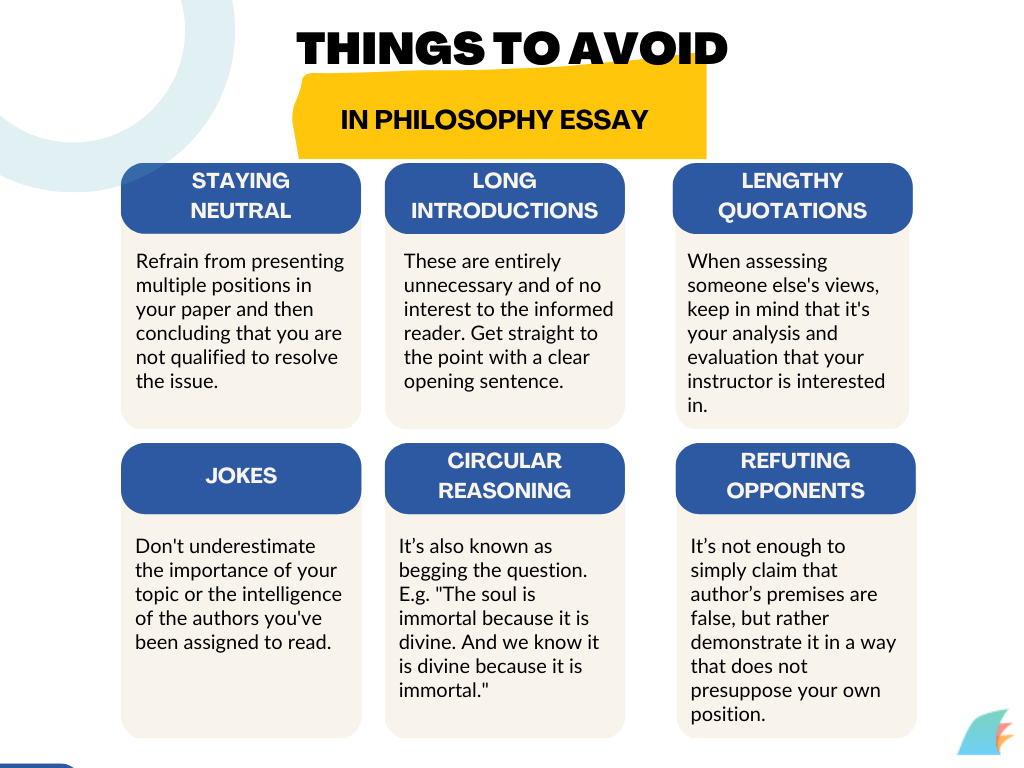So, the goal is clear – we need to understand how to write a philosophy essay. It should be such an essay that the teacher, who dared to assign this task, reads it with an open mouth – and with tears of amazement and a trembling hand, gives it an “A.”
What do we have? We have an author, an open document in Word, and a goal that is distant, but pleasant – a good grade. The author, of course, has the internet, and there are many essays to be found there. The question arises: why not take one and download it? The answer is that you can’t do it, because the teacher may be so cunning that he or she uses plagiarism detection programs, and you would not want to get a bad grade because of a poor mistake like this.
Of course, if your teacher is over 70 years old and carries hand-written notes, then you can take the risk. But if the teacher is about 30, and he or she carries a smartphone, netbook, ebook, or laptop and is signed in on social networks, then you shouldn’t risk it, although you can rely on the teacher’s laziness. Or on “write a paper for me assistance” from expert writers.
Table of contents
What is a philosophy essay?
A philosophy essay is a brief summary of individual views on a specific subject (phenomenon) or impressions from the literature read, the philosopher’s theory. The paper is written in a free style. Structurally, it can be divided into an introduction (the subject and issues that will be discussed are indicated), the main part (thesis and argumentation of one’s opinion, sub-conclusions), and general conclusions.
Structure of an essay on philosophy
Before we tell you how to write a philosophy essay, let’s figure out what this paper consists of:
- introduction
- main part
- conclusion
- list of sources
Introduction
The introduction of a philosophy essay should include a main thesis in which the student formulates their attitude to the problem raised on the topic. Suppose you are writing a philosophy essay based on the statements of philosophers. In that case, it is appropriate to provide at the beginning of the paper general information about the author of the aphorism: when they lived, what philosophical school they belonged to, etc.
Main part
In this section, the author presents arguments that confirm the thesis they put forward in the introduction. These can be examples from philosophical works or factual material: articles from the media, statistics, and data from scientific experiments.
Conclusion
In the final part of the essay, the student summarizes how correct the thesis they put forward turned out to be.
List of references
If in your paper, you quote someone, refer to statistical data, etc., it is worth including a bibliography in the structure of the philosophical essay, in which you list the sources used for preparation.
How to write a good philosophy essay
How to start a philosophy paper? Start with the topic. It is great if the topic is already set. You can immediately write it at the top of the paper and relax. If there is no topic, you need to brainstorm a bit. But the topic is often given to us from above – for example, it may be found in the training manual, but for this, it is necessary to find the training manual itself. Once you complete this quest, you will have a topic. The topic can be either broad (“my philosophy” – write what you want), or narrow (“the problem is such in the system of such/in the context of something”).
So as not to seem unfounded, we will give an example of a topic with such a scheme. Let’s suppose the topic is the ontological views of Democritus in the context of the development of European science. In our opinion, the luckiest are those who have a narrow topic – at least it is immediately understood what to write about. The plan is:
- Find information about the desired philosophy/concept/system on the internet.
- Look at what you have found.
- Choose the least suspicious source; it is desirable that the address should contain “philosophy” or another version of this word, but this is not necessary. A philosophical dictionary is also suitable, or you can use good, sensibly written books on the history of philosophy.
- Study the selected material.
- In your own words, retell the meaning.
If you are a student of a non-philosophical direction, then this is enough. It is even better if this is flavored with quotations from reputable sources. In this case, it is possible that it will be difficult to find fault with the essay. And, of course, don’t forget to add your opinion.
A broad topic will send your mind literally spinning. For example, we will take the very topic “my philosophy,” which frightens students of technical specialties annually.
For a start, it would be beneficial to deal with what exactly you would mean by the word “philosophy.” Here again the internet is useful, which can offer a generally accepted definition. If you agree with it, then this is the place to start. For example: “Agreeing with the generally accepted statement, I understand the philosophy,” and then add the necessary text. If you do not agree with the definition, then find another, more appropriate one – for example, a definition given by one of the philosophers. Or you can explain honestly that you do not know what “philosophy” is. There is nothing wrong with this. Many philosophers also did not know, but they were successfully engaged in it.
Speaking of philosophers: the broad topic makes it possible to show your deep knowledge in the field of the history of philosophy. Immediately we want to warn you: do not trust your hearing, as even if you have heard some last name in the lecture, you should double-check its spelling, just in case. Due to a small mistake or poor hearing in the classroom, Thales turns into Falos, or Sextus Empiricus becomes Sexus Impriques. Often, the names can be similar to each other, for example, Kant and Comte, but everyone knows that they are absolutely two different people.
Philosophy essay writing tips

The choice of the position in a philosophy essay
So, you have shown your knowledge, but what next? Next is the choice of position. Before you choose a position, sit down, think, and drink some tea. The choice of life position is not easy. The elementary option is to support the opinion of one of the recognized authorities. You can’t argue against Aristotle at least because he has been dead for more than two thousand years. But this option is for the laziest people. You can work harder: make up your system from pieces of others. The next method is a denial of authority. This is also possible, but requires a certain level of skill.
The most difficult option is to withdraw your position without relying on existing ones. If you succeed, treat yourself; you are a successful philosopher. We don’t want to upset you, but you are unlikely to succeed, most likely your position will be suspiciously similar to the opinion of someone else.
Well, something came up. This is your personal opinion, which is the most important thing in the essay. Without this component, it will immediately degenerate into a boring report. That is why the personal position should be written out brighter, clearer, and more voluminous than the rest of the text. This does not mean that you need to make these paragraphs bold, but just make them the culmination of the text. How? Read a textbook on rhetoric – the thing is not boring, and quite useful in life.
How to write a conclusion for a philosophy paper? In the final part of the essay, all conclusions made for each thesis presented in the main part are combined. The reader should come to a logical conclusion based on the arguments given. Finally, the problem is repeated and the final conclusion is made.
Philosophy essay writing techniques to avoid
Philosophy essay writing is not so difficult if you know several rules and stick to them consistently. However, we will start our guide with several general mistakes you should avoid:
- Lengthy introductions. Readers are not interested in unnecessary speeches at the beginning of the essay. Do not start with the common statement that the object of your research is very important and has been interesting to philosophers for hundreds of years.
- Lengthy quotations. Do not rely heavily on quotations – it is your paper, and professors expect to read your thoughts and arguments.
- Too many positions. Do not present several extra ideas and support them. Just evaluate and support the arguments presented.
- Argue correctly. When you are opposing some point of view, prove your ideas – you can’t just say that the other person’s conclusions are erroneous.

Philosophy essay writing: suggestions to consider
Now that you know what techniques should be avoided, in writing philosophy essays, we want to offer you the second part of college writing essay help – the useful part.
- Philosophy essay writing presupposes proper organization of your thoughts and paper in general. Make it easy for readers to follow the flow of your ideas; otherwise, your writing may not draw their attention.
- Support the arguments. Make sure your reader finds the answer to the following question: “Why should I believe that?”
- Anticipate objections. The best way to prove your viewpoint is to present several objections and show how to overcome them.
- Proofread your paper carefully. Have you ever met a person whose paper had nothing to be improved, or simplified, in the writing? A short draft is the best draft. By proofreading the paper, you not only correct the mistakes, but also cut unnecessary words.
Customarily, we can say that you may always count on us for your academic writing, no matter how complicated and personal your topic may be. EssayShark.com writers provide college writing essay help of the best possible quality to meet your demands and expectations.
Here is a free sample to look through for inspiration.
Philosophy essay sample
Existentialism In Jean-Paul Sartre’s “No Exit”
The secrets of human nature have always been the subjects of many philosophers who aimed to find out the answers to the eternal questions. Jean-Paul Sartre was one of those thinkers who considered the fiction literature as the way to disclose the philosophical arguments. He is known to be a great supporter of the existentialist movement that centered on the human freedom, happiness, and consciousness. The philosopher was concerned with the issue of people’s feelings and emotions, their behavior and reasons for it. One of the most influential works that present the ideas of existentialism and person’s identity is Sartre’s “No Exit” where he managed to portray the eternal problem of individuals’ falling values and principles.
The first point to make is to say that the existentialism shows us with the issue of individuality which is alone in the whole world, who is lost in their own prejudices and sins but still tries to find the way out and be saved. Sartre puts hi main ideas in the fiction play, attempting to explain the philosophical theories in the new light, to make the reader find the answers in the literature work with the imaged characters and absurd situations.
Sartre emphasized on the argument that the existence precedes the essence and “No Exit” only proved it, presenting people as free to choose their life. To be more precise, the real existentialist would always be true to themselves, would feel the responsibility for their actions, would never lie or hide something because they are confident in their deeds and choices. The main Sartre’s characters Garcin, Estelle, and Inez are just ordinary people who found themselves in the hell and do not want to declare the reasons for their damnation. The philosopher was confident that the existence of a person is their beliefs, their principles in life and views on the reality which they construe differently. The characters in the play are people who lost their values and faith, they are sinful but still, want to justify their deeds. It is important to say that Sartre here negatively depicts his existentialist ideas, telling the reader about the straight dependence of our identity and existence from others and their opinions. “Remember you’re not alone; you’ve no right to inflict the sight of your fear on me” (Sartre, “No Exit”) Moreover, we are those whom others want us to be, people try to be recognized and accepted and that is their core of existence.
Garcin, Inez, and Estelle are just playing the roles, they pretend to be somebody else just to hide their real faces and actions in the past. All of them try to avoid the judgment of the others; they are always in search of the mirrors not to see the eyes that despise or look down. “Don’t be afraid; I’ll keep looking at you for ever and ever, without a flutter of my eyelids, and you’ll live in my gaze like a mote in a sunbeam” (Sartre, “No Exit”). In this particular case, we can speak about Sartre’s primary idea of existence preceding the essence. He portrayed the characters as those who make their own choices, even the wrong and sinful ones, but still, it is their will to act in such a way, that is comparing to the inanimate objects, people define their existence. They can change everything around them, be free to dictate their own rules of life because they are conscious of the reality. What is more, Sartre aimed to show that very often our decisions depend on the other’s opinion because people lose their freedom of choice feeling too weak to withstand or make their decision. Garcin can not leave the room because he relies on Inez’s opinion, Estelle does not believe that she is real just till the moment other people become her mirror. “I’m your lark-mirror,my dear, and you can’t escape me…There isn’t any pimple, not a trace of one. So what about it? Suppose the mirror started telling lies? Or suppose I covered my eyes – as he is doing – and refused to look at you, all that loveliness of yours would be wasted on the desert air. No, don’t be afraid, I can’t help looking at you” (Sartre, “No Exit”). People are very cunning when it is about their own benefits in the life game. That is why, being so reliant on others, it turned out with the result that the only person we can trust in our self-perception is we. All in all, all the characters’ feelings, their perception of themselves are the product and of others’ decisions and view on them. Sartre wanted to prove that the existence is the ability of the individuality to have a choice in life regarding their status, profession, relationships, and self-identity.
It has to be said that the philosopher did not intend to show the real hell with the horrible tortures, Sartre wanted to present people with the hell on Earth when people themselves create it. Garcia, Inez, and Estelle are just the small members of the society, that ruin ones’ lives, being the victims of others’ opinions, prejudices, and stereotypes. “Old wives’ tales! There’s no need for red-hot pokers. Hell is—other people!” (Sartre, “No Exit”). The main characters realize that all their problems came from their lack of self-identity, their blind reliance on others’ judgment and loss of faith in themselves. People suffer because of others, and they want others to suffer from them in return. It is the rule of human existence to put the masks because it is easier to please the other’s needs and tastes, otherwise you will be excluded.
Jean-Paul Sartre managed to create the representation of the human existence, as being the significant part of the others’ views. Moreover, he showed the reader how false principles and lack of faith could end up in the pretending and self-delusion. The main characters of “No Exit” proved to be the society where the human existence depends on the existence of others and therefore construct it in their desired way. The most important is to remain themselves even if others do not believe in you and even reject your choices. It means you are somebody; you are strong existentialist who tries to single out something special, not subjected to the rest of the world.
In conclusion, Sartre and his fiction play present the new view on the philosophical arguments proved to be even more successful in explaining the ideas of existentialism. It means it is easier to answer the human questions, putting the individuals in the situations of life choice when their destiny and the future depend only on them, their self-perception and relationships to others’ decisions.
Works Cited
“Existentialism Is a Humanism, Jean-Paul Sartre 1946.” Marxists.org, 2017, https://www.marxists.org/reference/archive/sartre/works/exist/sartre.htm.
“Existence Precedes Essence: Understanding Existentialism – Knowledge Lost.” Knowledge Lost, 2017, http://www.knowledgelost.org/philosophy/existence-precedes-essence-understanding-existentialism/.
Sartre, Jean-Paul. No Exit and Three Other Plays. 1st ed., 1944, https://www.vanderbilt.edu/olli/class-materials/Jean-Paul_Sartre.pdf.
If you find this sample helpful, check out also Philosophy Essay Example about Causal Determinism and Philosophy Essay Sample about Realism and Idealism, or contact us to buy psychology essay









